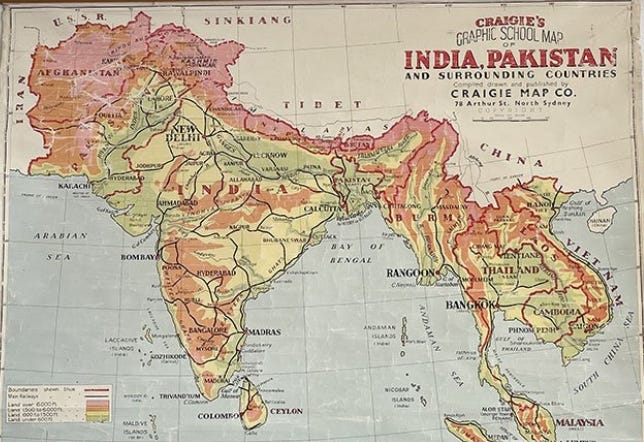Washington to Kashmir: How Power Writes the Rules
A lawsuit against the U.S. government and a renewed border conflict both trace back to the same force: elite control and public consequence.
Here at the Coffman Chronicle, we rarely report too much on international stories. There’s enough insanity in the domestic headlines to keep us up at night and panic writing. Sometimes, however, a few stories intersect and remind us of a more profound truth: there’s very little new under the sun, and certain patterns— if not repeat— rhyme.
We just hit 13,000 subscribers—thank you! We’re offering full access to The Coffman Chronicle at 50% off to celebrate.
Get exclusive analysis and fearless reporting you won’t find in corporate media.
Support truth. Stay informed.
Power Protects Itself: What the Iverson Case Reveals
On paper, it sounds like a headline from a parallel universe: “International Criminal Court Prosecutor Sues Trump Administration.” Scroll a little further, and the real story emerges: Eric Iverson isn’t suing on behalf of the ICC. He’s suing the U.S. government because it’s trying to punish him for doing his job prosecuting war crimes.
Iverson, a U.S. Army veteran and lead prosecutor at the ICC, filed a lawsuit in federal court this week challenging an executive order issued by former President Donald Trump. The order imposes sweeping sanctions on ICC personnel involved in investigations of U.S. allies, namely, Israel. But Iverson isn’t investigating Israel. He’s working on cases in Darfur, Sudan, far from U.S. strategic interests or direct entanglement.
And yet the order applies to him, ensnaring a man prosecuting crimes the U.S. ostensibly supports bringing to justice.
It threatens to freeze his assets, ban his travel, and isolate him professionally for trying to hold war criminals accountable—some of whom happen to be protected by powerful geopolitical patrons..
This isn’t about protecting Americans. It’s about preserving the structure of power, a structure that sees accountability as a threat, even when the crimes are happening half a world away. Though framed in the narrow legal language of First Amendment rights and executive overreach, Iverson's lawsuit is a window into something larger: a system where rules apply downward but rarely upward. Where “justice” is a tool of the powerful, not a limit on them.
This isn’t new. And it isn’t unique to America.
In fact, you can see the same pattern halfway around the world in a conflict that predates executive orders and drone strikes, but carries the same DNA.
The Old Lines Still Bleed: Power in South Asia
If Iverson’s case reveals how modern power rewrites the rules to shield itself, South Asia shows us what happens when those rules were written generations ago and never erased.
In recent weeks, tensions have flared again between India and Pakistan. Skirmishes at the border. Political sabre-rattling. Civilians caught in the crossfire.
After a recent terrorist attack, India launched missiles at multiple Pakistan sites just days ago. There are threats about limiting water flow from Indian-controlled rivers into Pakistan, a move that could escalate tensions into humanitarian crisis territory. And at the center, there is Kashmir, a disputed territory that both nations would like to claim for themselves.
It’s a cycle that feels inevitable until you remember that this border, like so many others, was never supposed to exist. It was carved in haste by colonial officials who knew they’d never have to live with the consequences.
The Partition of British India in 1947 was less a plan than a panic. Lines were drawn by men who would never walk the borders they created, lines that split families, communities, and cultures. Millions were displaced, and more than a million were killed. The tensions seeded by that decision have never fully healed.
While religion has often been politicized in this conflict, it’s not the root cause. This isn’t a religious war; it’s what happens when power imposes order without justice and then leaves others to manage the chaos.
Like in the Iverson case, the story isn’t just about the governments in conflict. It’s about how ordinary people inherit the violence of elite decisions, decisions that were never meant to serve them.
Same Map, Same Rules, Same Results
Iverson’s lawsuit and the rising tensions in South Asia may seem like two separate stories—different continents, different players, different timelines. But they are chapters in the same book: a book written by power, edited by empire, and read daily by people with no say in how it ends.
In both cases, we see a familiar dynamic. Decisions are made at the top—whether by presidents signing executive orders or colonial officers drawing borders—and the consequences cascade downward. Prosecutors get sanctioned. Villages get shelled. Water becomes a weapon. Civilians are asked to stay calm while governments stoke the fire.
These are far from the only examples; they’re simply the most recent. Look at the history of the world and you’ll find countless more—decisions made by the few, without regard for the many. Power shielding itself from scrutiny while cloaking its actions in moral superiority.
The lesson isn’t just that power corrupts. It’s that power is structurally insulated from accountability. Whether it’s the U.S. rewriting the rules to protect its allies or South Asian elites inflaming nationalist tensions to preserve control, the result is the same: the rules are different depending on which direction you’re looking.
Justice flows down. Violence flows down. Responsibility? Rarely.
And that’s the real thread running through these stories—the one we follow here week after week. Because this isn’t just about left vs. right. It’s about up vs. down. And if we don’t start naming that clearly, we’ll keep mistaking power’s performance for principle, and justice will stay ornamental.
We just hit 13,000 subscribers—thank you! We’re offering full access to The Coffman Chronicle at 50% off to celebrate.
Get exclusive analysis and fearless reporting you won’t find in corporate media.
Bibliography:
Human Rights First. Human Rights First Sues Trump Administration Over Sanctions Threatening U.S. Prosecutor at International Criminal Court. May 5, 2025.
Bloomberg Law. “ICC Lawyer Sues Trump Over Inability to Probe Darfur Atrocities.” May 5, 2025.
Human Rights First. Complaint: Iverson v. Trump et al. May 5, 2025.
CourtListener. Docket: Iverson v. Trump et al. Accessed May 7, 2025.
Civil Rights Litigation Clearinghouse. Iverson v. Trump et al. University of Michigan Law School. Accessed May 7, 2025.
Gettleman, Jeffrey. “India Retaliates for Attack in Kashmir It Blames on Pakistan.” The Wall Street Journal, May 6, 2025.
The Times. “Islamabad Retaliates After Operation Sindoor – As It Happened.” The Times (UK), May 6, 2025.
NPR. “Tensions Escalate as Pakistan Calls India’s Operation ‘An Act of War.’” NPR, May 6, 2025.
Slater, Joanna. “Are India and Pakistan at Risk of War? Here’s What to Know.” The Washington Post, May 7, 2025.
Wikipedia. “2025 India–Pakistan Standoff.” Last modified May 7, 2025.








